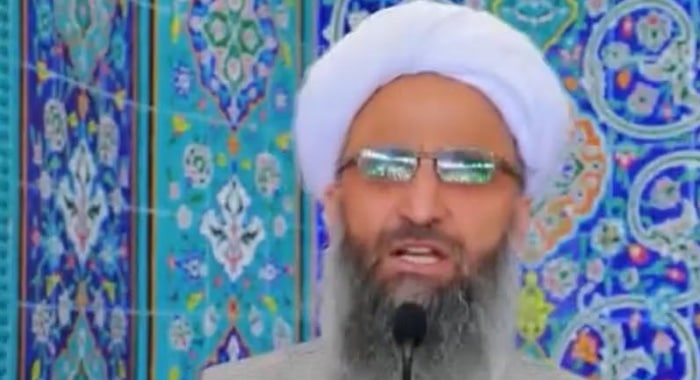A growing rift between independent Islamic scholars and the Taliban regime intensified on Friday as Maulawi Abdul Qahir, a prominent cleric in Balkh province, delivered a fiery sermon condemning the Taliban’s promotion of tribalism and ethnic discrimination. Addressing a packed congregation at Rawza Sharif Mosque, Maulawi Qahir warned that such divisive practices would ultimately destroy any Islamic system claiming legitimacy.
The sermon triggered immediate backlash from the Taliban. According to eyewitnesses and local sources, members of the group’s armed special units, led by Maulawi Obaidullah—the Taliban’s Director for the Propagation of Virtue in Balkh—arrived at the mosque with three military vehicles and attempted to arrest the cleric. Worshippers resisted the move, chanting “Death to the Taliban” as tensions boiled over within the sacred premises. Taliban members reportedly confiscated recording devices and detained several attendees amid widespread protest.
Maulawi Qahir, who has been an outspoken critic of Taliban rule, had previously rebuked the group during its Loya Jirga, stating, “Territory can be seized with suicide bombers and car bombs, but not people’s hearts.” His remarks are part of a growing trend of defiance from Afghanistan’s religious scholars who accuse the Taliban of betraying Islamic principles in pursuit of political power.
Among other notable dissenters is Maulawi Abdul Salam Abed, a well-known cleric who called on Taliban members to disobey orders from their leadership. After criticizing the group in the aftermath of a Kabul bombing, Abed was injured and ultimately forced to seek refuge in Türkiye. In his final sermon at the Abdul Rahman Grand Mosque, Abed accused the religious establishment of moral cowardice, declaring, “They fired people from their jobs and we stayed silent. They issued bizarre decrees and we remained silent. We didn’t criticise, hoping they’d improve.” He concluded with a stark warning: “Under the previous regime, everyone was included except the Taliban, and the government still fell. Now it’s only the Taliban, and no one else.”
These developments highlight the Taliban’s deepening crisis of legitimacy and the erosion of public trust nearly four years into their rule. While the regime continues to suppress opposition, it faces mounting challenges from within the Islamic clergy and among ordinary citizens, who increasingly view its policies as repressive, ethnocentric, and devoid of the inclusive spirit central to Islamic governance.





